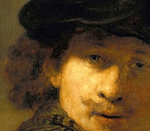
"The Judgment of Solomon"
Two mothers living in the same house, each the mother of an infant son, came to Solomon. One of the babies had died, and each claimed the remaining boy as her own. Calling for a sword, Solomon declared his judgment: the baby would be cut in two, each woman to receive half. One mother did not contest the ruling, declaring that if she could not have the baby then neither of them could, but the other begged Solomon, "Give the baby to her, just don't kill him!"
The king declared the second woman the true mother, as a mother would even give up her baby if that was necessary to save its life. "All Israel heard of the judgment that the king had rendered, and they stood in awe of the king because they perceived the wisdom of God was in him to do justice." (1 Kings 3:28)
Lucas Cranach the Elder (c. 1472 – 16 October 1553) was a GerRenaissance painter and print maker in woodcut and engraving. He was court painter to the Electors of Saxony for most of his career, and is known for his portraits, both of German princes and those of the leaders of the Protestant Reformation, whose cause he embraced with enthusiasm. He was a close friend of Martin Luther, and eleven portraits of that reformer by him survive. Cranach also painted religious subjects, first in the Catholic tradition, and later trying to find new ways of conveying Lutheran religious concerns in art. He continued throughout his career to paint nude subjects drawn from mythology and religion.
Early in his career he was acclaimed for the realism with which he painted still life, game and wild life. Before 1508 he had painted several altar-pieces for the Castle Church at Wittenberg. Before 1509 Cranach went to the Netherlands, and painted the Emperor Maximilian and the boy who afterwards became Emperor Charles V. Cranach was the court painter from 1505 to 1550 to the electors of Saxony in Wittenberg, an area in the heart of the emerging Protestant faith. His patrons were powerful supporters of Martin Luther, and Cranach used his art as a symbol of the new faith. Cranach made numerous portraits of Luther, and provided woodcut illustrations for Luther's German translation of the Bible. Somewhat later the duke conferred on him the monopoly of the sale of medicines at Wittenberg, and a printer's patent with exclusive privileges as to copyright in Bibles. Cranach's presses were used by Martin Luther. His apothecary shop was open for centuries, and was only lost by fire in 1871. The Lutheran Church remembers Cranach as a great Christian on April 6 along with Dürer.